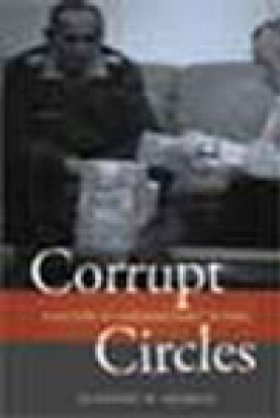Corrupt Circles: A History of Unbound Graft in Peru


As Peru prosecutes former president Alberto Fujimori and other alleged participants in state crimes, the country's longstanding culture of impunity is under attack. The subject of corruption has acquired a new prominence, both in Peru and in Latin America more broadly. In his new book, Corrupt Circles: A History of Unbound Graft in Peru, Alfonso W. Quiroz examines the history of Peruvian corruption dating back to the country's colonial period. This panel discussion provided an opportunity to gather the Washington area's anti-corruption and Latin America specialists to connect contemporary issues of corruption in Latin America and the world with the historical record of corruption, particularly in Peru.
Alfonso Quiroz, Baruch College, City University of New York, argued that not only does corruption undermine institutions, distort policies, and frustrate prospects of development, but it also grows from weak institutions. Corruption appears consistently in history, and it is able to rapidly adapt to new economic and technological changes. Quiroz focused not only in the scandals that corruption causes, but also on the systemic corruption in Peru that hurts developmental efforts. His book traces corruption practices from the Colonial period to current times, elaborating on systemic practices that undermine institutions and further foster corruption. It also estimates the direct and indirect costs of corruption in the 18th, 19th and 20th Centuries. Quiroz highlighted that one "of the historical lessons learnt in the 1990s and the first decade of the 21st Century is that political and private corruption go together when legal protections and regulations fade and fail to limit abuse of power and greed." According to Quiroz, after 2000 corruption has not been curved effectively, but some improvement is visible. In the case of Peru, new anti-corruption policies have been implemented accompanied by good macro-economic performance. However, current political and economic signs "indicate that a new cycle of high corruption is starting with negative effects."
Álvaro Vargas Llosa, Senior Fellow, The Center on Global Prosperity, Independent Institute, highlighted two important linkages that are visible in Quiroz's book– corruption and institutions and quantifying corruption and how it prevents development. The connection here presented by Quiroz is that weak or inadequate institutions inhibit development in countries. This book, by looking at the Colonial and Republican time, is able to accurately and with a sense of authority explain the formation of institutions in Peru. Vargas Llosa identified "five principles of oppression" that dominated institutions in Latin America in the last 500 years –corporativism, mercantilism, privilege, bottom-up wealth transfer, and political law. These variables are applicable to the Colonial time, but as institutions are concerned, not much changed and therefore these five variables are applicable to the Republican time. During this period, corruption changed its focus depending on the regime type or the political identity of parties, but not in its nature. There was an underlying system that sustained corruption. Finally, Vargas Llosa explained that corruption has been seen as the cause for democratic instability, but there is a need to re-frame corruption as a symptom of weak institutions and, therefore, reject the concept that corruption is an element of culture.
Michael Johnston, Colgate University, praised Quiroz's book for its rigorous historical account and it high standards both quantitatively and qualitatively. He pointed to the fact that through this book, the reader can clearly see the adaptability of corruption and how this phenomenon can evolve not changing fundamentally in nature. "Corruption is not just something that happens to a society," he pointed out. Johnston questioned the notion that political will is needed to reverse corruption since he believes "corruption reflects an excessive political will or perhaps a political will that goes unchecked and in unaccountable ways." Also, he referred to the notion of the Resource Curse before the petroleum era and how it is almost identical to the previous dependency on mine extractions which were also filled with corruption scandals. Finally, Johnston stated that if we define corruption as an event that happens in a particular place or way, we are reminded by this book that we are missing fundamental dynamics that happen in society. Corruption was not a secret; there was no lack of evidence and people were always aware of it, but the measures to tackle this problem have been inefficient. Transparency is perceived as the best way to tackle corruption, but mechanisms need to be implemented to identify those acts that constitute corruption and the "who" and the "how" need to be very clear and defined in order to implement successful policies and actions to prevent and punish acts of corruption.
Speaker

Professor of History, Baruch College and Graduate Center, City University of New York
Hosted By

Latin America Program
The Wilson Center’s prestigious Latin America Program provides non-partisan expertise to a broad community of decision makers in the United States and Latin America on critical policy issues facing the Hemisphere. The Program provides insightful and actionable research for policymakers, private sector leaders, journalists, and public intellectuals in the United States and Latin America. To bridge the gap between scholarship and policy action, it fosters new inquiry, sponsors high-level public and private meetings among multiple stakeholders, and explores policy options to improve outcomes for citizens throughout the Americas. Drawing on the Wilson Center’s strength as the nation’s key non-partisan policy forum, the Program serves as a trusted source of analysis and a vital point of contact between the worlds of scholarship and action. Read more
